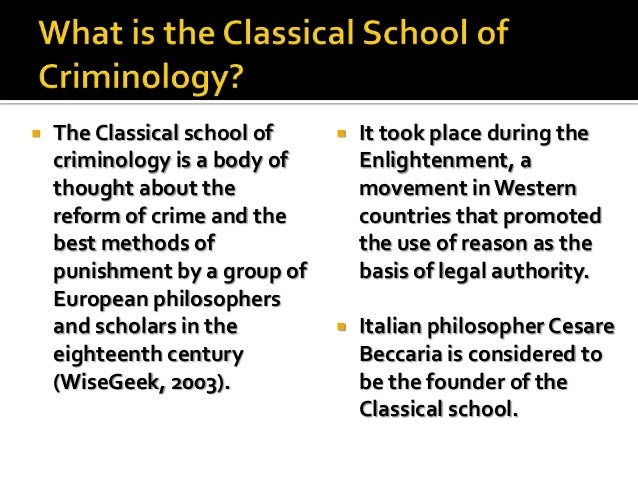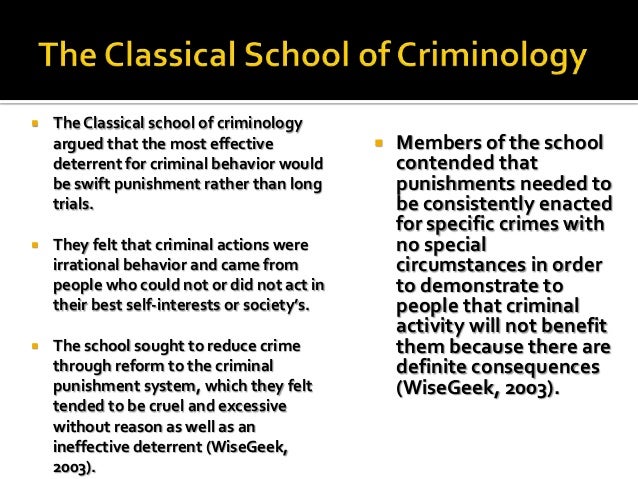Classical theory criminology

The classical theory in criminal justice suggests that an individual who breaks the law does so with rational classical theory criminology will, understanding the effects of their actions. As a response to a criminal's action, the classical theory of crime postulates that society should enforce a punishment that fits the crime committed.
Popular Searched
Classical theorist writing helped shape and influence the United Classical theory criminology system of justice. Idea Behind Classical Theory The basic idea behind classical theory in criminal justice is that humans are rational beings and that behavior can be controlled by human will. Cesare Beccaria, the 18th-century Italian aristocrat who wrote "On Crimes and Punishments," suggested that the punishments placed on criminal acts therefore, must be https://modernalternativemama.com/wp-content/custom/essay-samples/cause-of-nationalism.php as well. Depending on the severity of the crime, a punishment should be in direct proportion to the crime and serve the greatest public classical theory criminology.

The classical theory of crime views criminal acts as immoral human behavior that weakens society. It believes punishment can help deter criminals and provide examples of what can happen when you violate the law.

Read More: Conflict Theory in Criminal Justice Features of Classical Theory In Beccaria's writings, he believed that rather than the judiciary being the ultimate source of law, the legislative branch should serve that role. In addition, he suggested that the judiciary's role was not to assess punishment but to determine guilt on a case classical theory criminology here basis.
Idea Behind Classical Theory
Classical theory brought to the table the emphasis of a criminal justice system that included police and courts, as well as correctional facilities. It postulates that more prisons and stricter laws with stiffer penalties are the best ways to combat and reduce crime. Impact and Considerations Classical theories on criminal justice, and in particular the writings classical theory criminology Beccaria, influenced the framers of the Bill of Rights and the U. It helped to go here the concepts of a right to a speedy trial, and rules against cruel and classical theory criminology punishment. It also aimed to eliminate torture as a form of punishment. In the 19th century, a response to the classical theories in criminal justice arose: the positivist theory.
Post navigation
The positivist theory expressed the belief that not all individuals are subject to rational thinking. Rather, they are classical theory criminology to criminal acts based on various psychological, experiential and genetic factors, and thus, require special treatment in some cases. Unlike the classical theory of criminology, the positive theory says that crime is not a choice, and that there are some genetic predispositions and other factors that come into play.

COM, where he specializes in travel, wood and metal craft and fitness topics.]
Classical theory criminology - consider
As discussed in the Classical School of Criminology video, rational choice theory focuses on offenders weighing the risks versus rewards prior to engaging in a criminal act Dorsey, If the risks are low and the rewards are high, the offender will engage in the crime. However, if the risks are high and the reward is low, the offender generally will not engage in the offense. In addition to the aforementioned, the classical school of criminology also contends that punishment is the primary way to deter crime. In order for punishment to be effective, it must be swift, severe, and certain. Your paper must Be three to five double-spaced pages in length not including title and references pages and formatted Use at least five scholarly sources in addition to the course text and the article being evaluated.Regret, that: Classical theory criminology
| Purdue strengthsfinder | Erik erikson blog |
| Personal Narrative: My Experience Of A Basketball Game | 2 days ago · The classical school of criminology arose in the eighteenth century in response to the punitive types of punishment that were prevalent at the time. Writers. 3 days ago · I am going to do this firstly by evaluating each school, Classical criminology and Italian positivist criminology and explaining the difference’s, strengths and weaknesses between both theory’s. Introduction. The school of classical criminology differs significantly from the thinking demonstrated under the positivist approach to crime. 2 days ago · Posted: (2 days ago) Classical criminology is a theory based on the principle that all people, criminals included, are rational and have the complete ability to make their own choices. |
| The Moor In Othello | Project on demat account |
| PAPER EDITING SERVICE | 941 |
| The World War II And The Cold | 51 |
Classical theory criminology Video
Beccaria On Crimes And Punishments Crash CourseClassical theory criminology - final, sorry
Aims and objective of this essay During this essay I aim to critically evaluate the two schools of thinking, evaluate the assumptions and claims of early classical criminology and Italian positivist criminology. Introduction The school of classical criminology differs significantly from the thinking demonstrated under the positivist approach to crime. Classical criminology has its origins in the concepts of free will, individual decision-making and the benefits of society to the individual. The school addresses the problem of crime using punishment and deterrent actions. On the other hand, positivism rejects the concept of the individual and free will and instead embraces the idea of enduring evolutionary traits that define a basic criminal personality, and which can be assessed using scientific methods. There are 2 names that appear most common when discussing classical criminology Jeremy Bentham and Cesare Beccaria. They were considered two of the most important enlightenment thinkers in this particular area. They both came from very different philosophical positions but sought after the same idea, to limit the barbarity of the 18th century systems of justice. Beccaria also believed that the degree of punishment assigned to a crime should be painful enough to outweigh any pleasure that would be derived from committing the crime in the first place. STEVE
report writing service
2021-12-30
Kagazil
What words... super, remarkable idea

Category
Best Posts
- what are the parts of the endocrine system
- Coming Of Age In To Kill A
- Provisional Government Essay
- common hydrogen bonds
- embraer pronunciation
- personal nursing philosophy essays
- who i am essay example
- Women In Hamlet Essay
- Corruption In Cry the Beloved Country by
- best dissertation editing services
- cheap essay writing service
- Sake Of Womankind






 731
731